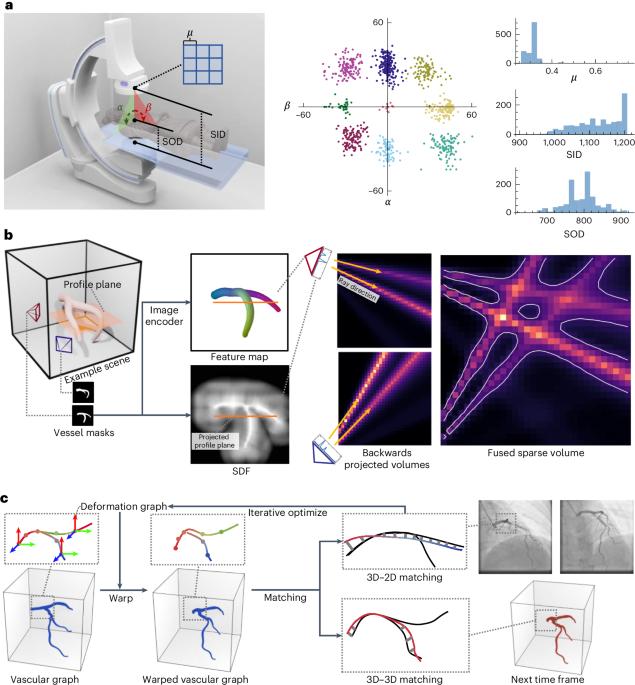Sparse and transferable three-dimensional dynamic vascular reconstruction for instantaneous diagnosis
IF 23.9
1区 计算机科学
Q1 COMPUTER SCIENCE, ARTIFICIAL INTELLIGENCE
引用次数: 0
Abstract
Three-dimensional (3D) structural information of cardiac vessels is crucial for the diagnosis and treatment of cardiovascular disease. In clinical practice, interventionalists have to empirically infer 3D cardiovascular topology from multi-view X-ray angiography images, which is time-consuming and requires extensive experience. Owing to the dynamic nature of heartbeats and sparse-view observations in clinical practice, accurate and efficient reconstruction of 3D cardiovascular structures from X-ray angiography images remains challenging. Here we introduce AutoCAR, a fully automated transfer learning-based algorithm for dynamic 3D cardiovascular reconstruction. AutoCAR comprises three main components: pose domain adaptation, sparse backwards projection and vascular graph optimization. By merging the X-ray angiography imaging parameter statistics of over 1,000 clinical cases into synthetic data generation, and exploiting the intrinsic spatial sparsity of cardiac vessels for computational design, AutoCAR outperforms state-of-the-art methods in both qualitative and quantitative evaluations, enabling dynamic cardiovascular reconstruction in real-world clinical settings. We envision that AutoCAR will facilitate current diagnostic and intervention procedures and pave the way for real-time visual guidance and autonomous catheter navigation in cardiac intervention. Yinheng Zhu et al. present AutoCAR, an automated algorithm for reconstructing three-dimensional cardiovascular structures from X-ray images. It uses transfer learning and vascular graph optimization to achieve high efficiency and accuracy, with the goal to enable medical procedures and diagnosis in real-world settings.


用于瞬时诊断的稀疏和可转移的三维动态血管重建
血管的三维结构信息对心血管疾病的诊断和治疗至关重要。在临床实践中,介入医师必须从多视点x线血管造影图像中经验性地推断三维心血管拓扑结构,这既耗时又需要丰富的经验。由于临床实践中心跳的动态性和稀疏视图观察,从x射线血管造影图像中准确有效地重建三维心血管结构仍然具有挑战性。在这里,我们介绍AutoCAR,一种基于迁移学习的全自动动态三维心血管重建算法。AutoCAR主要包括姿态域自适应、稀疏反向投影和血管图优化三个部分。通过将超过1000例临床病例的x射线血管造影成像参数统计数据合并到合成数据生成中,并利用心脏血管固有的空间稀疏性进行计算设计,AutoCAR在定性和定量评估方面都优于最先进的方法,从而在现实世界的临床环境中实现动态心血管重建。我们设想,AutoCAR将促进当前的诊断和干预程序,并为心脏干预中的实时视觉引导和自主导管导航铺平道路。
本文章由计算机程序翻译,如有差异,请以英文原文为准。
求助全文
约1分钟内获得全文
求助全文
来源期刊

Nature Machine Intelligence
Multiple-
CiteScore
36.90
自引率
2.10%
发文量
127
期刊介绍:
Nature Machine Intelligence is a distinguished publication that presents original research and reviews on various topics in machine learning, robotics, and AI. Our focus extends beyond these fields, exploring their profound impact on other scientific disciplines, as well as societal and industrial aspects. We recognize limitless possibilities wherein machine intelligence can augment human capabilities and knowledge in domains like scientific exploration, healthcare, medical diagnostics, and the creation of safe and sustainable cities, transportation, and agriculture. Simultaneously, we acknowledge the emergence of ethical, social, and legal concerns due to the rapid pace of advancements.
To foster interdisciplinary discussions on these far-reaching implications, Nature Machine Intelligence serves as a platform for dialogue facilitated through Comments, News Features, News & Views articles, and Correspondence. Our goal is to encourage a comprehensive examination of these subjects.
Similar to all Nature-branded journals, Nature Machine Intelligence operates under the guidance of a team of skilled editors. We adhere to a fair and rigorous peer-review process, ensuring high standards of copy-editing and production, swift publication, and editorial independence.
 求助内容:
求助内容: 应助结果提醒方式:
应助结果提醒方式:


